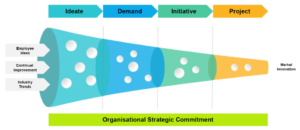The concept of entrepreneurship has existed for centuries, but over time the definition has evolved from references to adventurers to the more modern holistic view of somebody combining skills, resources, energy, and time for the greater benefit of themselves or an organization. In its purest form, entrepreneurs are individuals that identify a need and provide a means to fill it; some might even call it innovation.
Innovation is one of the most important factors modern organizations need to remain competitive. But what is innovation? And why is it so important to organizations?
To address the first question, the word “innovation” is derived from the Latin verb inventive, meaning “renew”. In modern-day complex business environments, it simply means to establish new techniques, refresh existing processes, or establish successful ideas to create more business value.
Let us look at why innovation is important in today’s organizations. When organizations are looking at ways to increase profit margins or strengthen their competitiveness within their immediate market, they can always review their cost model and drive prices down, but this is only a temporary measure and eventually, prices will go up as the shareholder demand for profits increase. The alternative is to create an element of differentiation in the market, which is driven by the development of new products or services to distinguish themselves from their competitors following a defined ideation process.
Innovation in an organization requires an understanding that without execution, it is simply ideation. The process of innovation, therefore, consists of the following steps: Ideation, Demand, Initiative, and Project Execution.
There is myth and mystique surrounding innovation, namely that its key lies in finding great ideas and selecting the best ones. However, the more common trend is either that ideas are not collected in an orderly fashion, or ideas collected are not actioned in an appropriate amount of time, ideas might even get lost in the overall process. The fact remains, regardless of how good an idea is, it cannot be successfully implemented if there is no control behind it.

Ideas can be generated from internal employees, market trends, or can be associated with continual improvement. The gathering of ideas allows organizations to create opportunities for investments through the initiation of projects, but before the actual projects can be executed, appropriate actions are required to safeguard the organization. This is achieved through Demand Management, a process which is designed to consider all factors surrounding potential projects. This includes strategic commitment, organizational value proposition, resourcing, and internal/external market situations, just to name a few. These elements need to be combined with previous commitments and ongoing activities to ensure demands are not putting the organization at risk. Demand Management is only successful when the output provides appropriate prioritization and aligns business value with the strategic commitment of the organization.
Converting a demand into an initiative allows an organization to act on an opportunity identified within the market. With conceptualized demands that have been prioritized and aligned with strategic objectives, organizations have an opportunity to assess those demands and correlate them with the trends in the market, further strengthening the position of each demand and the potential of it being converted into a project, and ultimately adding business value.
With established initiatives in place, organizations can now seek to convert these into dedicated projects incorporating allocated budgetary values, organizational resources, established timelines, and producing the steps required to deliver the result. In-depth and detailed analysis against individual projects enables organizations to realize the business value and reduce the risk of operational activities, resulting in financial efficiencies that can be measured against the initial project budget and the actual time consumed by resources in order to complete the engagement.
At Devoteam, we pride ourselves in our ability to support organizations to introduce and implement the complete innovation process with the aim of meeting organizational standards and create success based on their strategic objectives.
